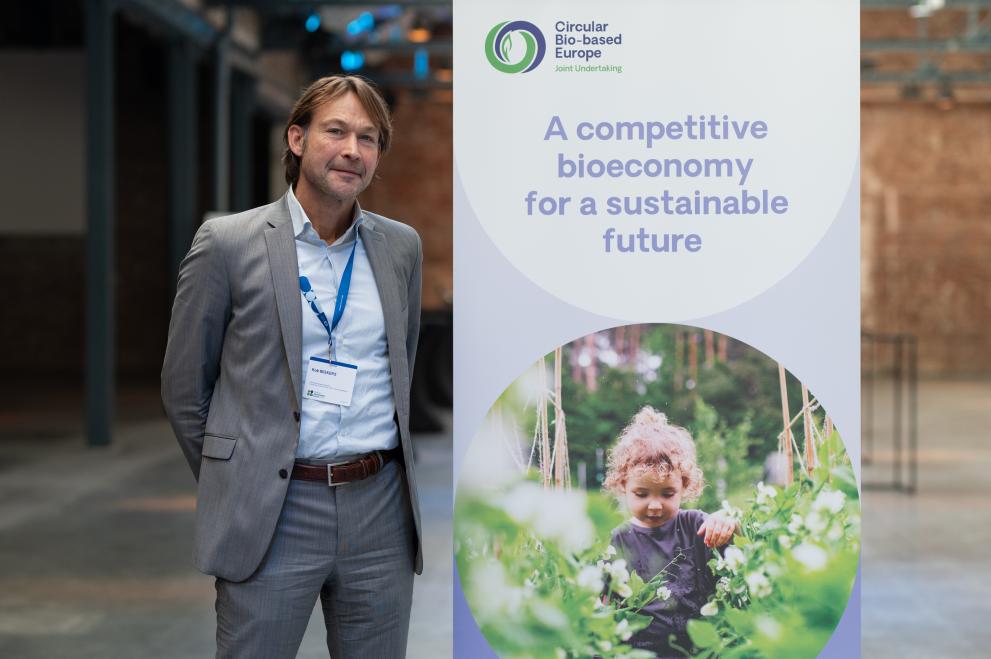'Circularity will be the cornerstone for any industry moving forward. Europe’s competitiveness and strategic autonomy will depend on its ability to lead in green technologies.'
Rob Beekers, Chair of the CBE JU Governing Board

On 30 November 2024, the Circular Bio-based Europe Joint Undertaking (CBE JU) marks three years since its establishment. Launched in 2021, CBE JU has since contributed to strengthening Europe’s bioeconomy, making it more competitive, circular, and collaborative. Together with its founding partners, the European Commission and the Bio-based Industries Consortium (BIC), CBE JU is helping Europe lead in sustainable innovation, drive green growth and modernise the industrial base.
CBE JU-funded projects have accelerated the transition to bio-based solutions, with over 36 novel products now on the market. These products span across more than ten sectors, from food and feed ingredients to sustainable plastics, green chemicals, and bio-based packaging, often with significantly better properties than fossil-based alternatives.
In addition to launching new products, CBE JU has provided significant support to innovators at the forefront of the bio-based sector. Since 2021, the initiative has funded four industrial-scale biorefineries and 44 demonstration plants. With a focus on inclusivity, CBE JU has also supported small and medium-sized enterprises, which make up one-third of its beneficiaries, and has empowered 70 organisations from the agricultural, forestry, and farming sectors to develop and strengthen their bioeconomy.
'Circularity will be the cornerstone for any industry moving forward. Europe’s competitiveness and strategic autonomy will depend on its ability to lead in green technologies.'
Rob Beekers, Chair of the CBE JU Governing Board

In recognition of the anniversary, Rob Beekers, Chair of the CBE JU Governing Board, stated that circularity will be the cornerstone for any industry moving forward: ‘Europe’s competitiveness and strategic autonomy will depend on its ability to lead in green technologies.’ Beekers highlighted how CBE JU accelerates the development of circular bio-based products in Europe. ‘By combining public funding with private innovation, we reduce our dependency from abroad and empower our industries to compete globally while delivering societal and environmental benefits,’ he said.
CBE JU-funded projects are driving resource efficiency and low-emission technologies to foster circularity across industries. The CBE JU-funded projects are developing circular processes in many areas: 10 projects are pioneering low-emission solutions, 10 are working to eliminate waste, 8 are reducing pollution, and 9 are implementing energy-saving practices.
The partnership has also championed sustainable product design, with 24 projects creating biodegradable, compostable, recyclable, and reusable materials that align with Europe’s green transition goals. Another 10 projects are advancing circular processes to ensure the sustainability of industrial production, setting new standards for future green industries.
'Together, we are accelerating the transition to a circular economy by pioneering innovative solutions that not only drive sustainability but also create new opportunities for economic growth and environmental stewardship.'
Helena Vieira, Chair of the CBE JU Scientific Committee

Helena Vieira, Chair of the CBE JU Scientific Committee, emphasised how CBE JU-funded projects demonstrate how scientific innovation drives real-world solutions. ‘By advancing circular processes and products, such as the development of biodegradable, compostable, recyclable, and reusable materials, these projects are reshaping industries and fostering a future where sustainability is embedded in every stage of production and consumption,’ she said.
Dr Vieira added that the success of these projects reflects the power of collaboration between industry, academia, and the public sector, accelerating the transition to a circular economy while creating economic growth opportunities: ‘Together, we are accelerating the transition to a circular economy by pioneering innovative solutions that not only drive sustainability but also create new opportunities for economic growth and environmental stewardship.’
Collaboration is a cornerstone of CBE JU’s mission. The initiative has fostered the participation of primary producers in 11 projects, integrating farmers, aquaculture producers, and foresters into the bio-based economy. Another 6 projects focus on waste management, exploring new circular uses for waste streams.
With 63 beneficiaries from previously underrepresented EU countries and regions, CBE JU has broadened the reach of bio-based innovation. Its projects have launched 27 new value chains that span from raw material production to end-product applications, bringing innovation and circularity to every link in the chain. These value chains blend new biomasses and advanced technologies with established methods, creating innovative solutions that strengthen Europe’s bio-based economy.
‘The public-private partnership has enabled more regions and countries to actively contribute to and benefit from the circular bioeconomy. This openness strengthens our collective impact and drives innovation from every corner of Europe.’
Sari Tasa, Chair of the CBE JU states representatives’ group
Sari Tasa, Chair of the CBE JU states representatives' group, highlighted: ‘CBE JU’s commitment to inclusivity ensures that the transition to a circular bioeconomy leaves no region behind but also challenges frontrunners.’ She praised the partnership’s ability to unite stakeholders across Europe, stating: ‘The public-private partnership has enabled more regions and countries to actively contribute to and benefit from the circular bioeconomy. This openness strengthens our collective impact and drives innovation from every corner of Europe.’
Tasa also noted the value of collaboration and knowledge-sharing: 'The success of CBE JU lies in its ability to unite stakeholders from all regions and countries, creating a truly European innovation network. The practical collaboration and knowledge-sharing platforms ensure that the benefits of the bio-based economy are shared widely, creating jobs and boosting local economies.'